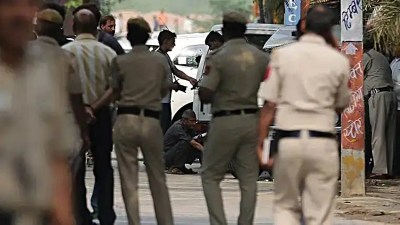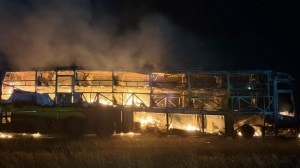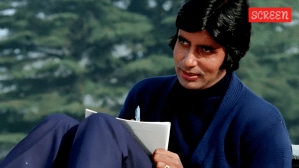Water can really be a leverage mechanism to help build sustainability & development: Dutch Special Envoy to UN
"Too much water or too little water hits our economy. The Netherlands is (also) a country where water always is and has been part of the way we develop ... Our water authorities are almost 1,000 years old, so we have a water democracy," says Henk Ovink.
 Henk Ovink, Dutch Special Envoy to the United Nations for International Water Affairs
Henk Ovink, Dutch Special Envoy to the United Nations for International Water Affairs
India and the Netherlands share a similar mindset when it comes to tackling the complexities of water treatment and conservation, says Henk Ovink, Dutch Special Envoy to the United Nations for International Water Affairs. In an interview with Prabha Raghavan, Ovink says how he sees bilateral collaboration on water progressing and how learnings from the ‘Water as Leverage’ project in Chennai could be scaled up. Edited excerpts:
How important is water in the overall bilateral collaboration between India and the Netherlands? How has that affected the targets that the two countries have set?
Too much water or too little water hits our economy. The Netherlands is (also) a country where water always is and has been part of the way we develop … Our water authorities are almost 1,000 years old, so we have a water democracy.
Water is one of our biggest challenges in the context of Sustainable Development Goals. Water can really be a leverage mechanism to help build sustainability, development and resiliency.
For this reason, we looked at what to target and with climate change and urbanisation only becoming more extreme, we said let’s look across the water agenda — not only at water quality or waste-water treatment, (but also) water provision and how we treat our natural resources like the acquifer (an underground layer of water-bearing permeable rock, rock fractures or unconsolidated materials like gravel, sand, or silt). (We also wanted to) look at agriculture…(as well as) our cities…you can’t focus on one (aspect).
That makes the story always a little more complex, but this is what I think the countries of India and the Netherlands share. We’re not afraid of that complexity.
What progress have you seen in the targets you have set? Are there any roadblocks you have been faced with?
The focus was on different aspects of treating polluted water, looking at your rivers, solid and waste-water management, looking at resiliency — both on your coasts as well as in your cities — (and) looking at water supply. We also have developed, in the past year, a programme looking at resilient cities — the capacity of your cities in the context of dealing with climate change. So, there are numerous aspects
It would be very easy to say, let’s do 200 cities or 10 river basins as targets and then measure progress. But, as we started, we said, ‘Let’s turn it around. Let’s first start with the opportunities that are there.’ Those opportunities were either identified through business-to-business, knowledge-to-knowledge, or a combination of business and knowledge, as well as with the government.
One project is on the Ganges—the cleaning part of that (Namami Gange).
I think the first phase was really more of finding the opportunity so we can build a solid base for our Indian-Netherlands water collaboration … Now we have 12 opportunities.
I don’t think we set clear targets yet on the water technology … When I set up ‘Water as Leverage’, it came out of a bigger research of water, climate and urban vulnerability in South and Southeast Asia. We identified 30-plus hotspots where the needs were biggest (and) also the opportunities …we identified in Chennai a dozen opportunities, and we’re building the cases around them.
The Ministry of Jal Shakti asked us, based on the first results, how to scale that up, and we are now working with them and have developed a proposal to scale this up for (more) cities in India.
What technologies from your projects so far have the potential to be scaled up for other parts of the country?
One is the technology on waste-water treatment. I think the Netherlands and India share the same fascination and culture on innovation. That is also why a lot of the water technology companies that work in the Netherlands find a solid ground here in India.
(On) waste-water treatment, solid waste treatment, a more circular approach to waste, not seeing it as a leftover, but as an asset for production. There are a lot of technology that resonate with these challenges.
You could say the Dutch approach is not only to look at how you can fix (the problem). If you don’t go to the source, the problem will only grow. At the same time, if you only look at the source, you’ll never clean up your rivers. So you have to look at both— it’s source mitigation as well as impact adaptation and mitigation.
This is not only Dutch technology, although we bring a lot of capacity. If we look at the past in Chennai, water was treated naturally. Water was treated as a holy resource and, then, in the middle of the temple tanks, the water again, went back into the aquifer. So it was a very natural system…with nature-based solutions…capturing the water in neighborhoods, in the streets, but also in the tanks, storing that water, using those water tanks as overflow capacity when huge rain events happen, bringing it back into the aquifer, you can start to clean the aquifer, recharge it and then again use it as a natural resource.But the situation will be different everywhere, so a more tailored approach is needed.
Harvesting the water on green roofs mitigates also the risks of heat islands so extreme heat is more easy to deal with. Those solutions help you treat the water, help you treat the waste, turn waste water and waste treatment into a business case and an opportunity for a public private institute to deal with water.
But the situation will be different everywhere, so a more tailored approach is needed. A city like Chennai is not the same as Kochi or Mumbai or Delhi or smaller cities.
Every city…demands a systems analysis.



- 01
- 02
- 03
- 04
- 05



























